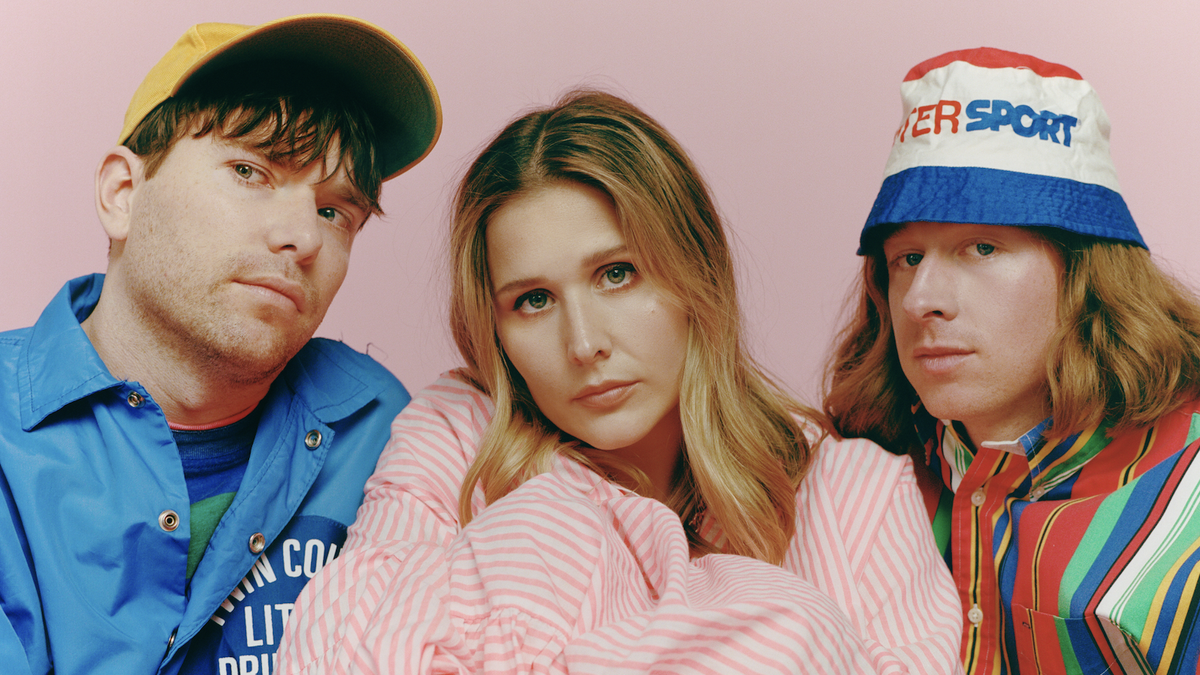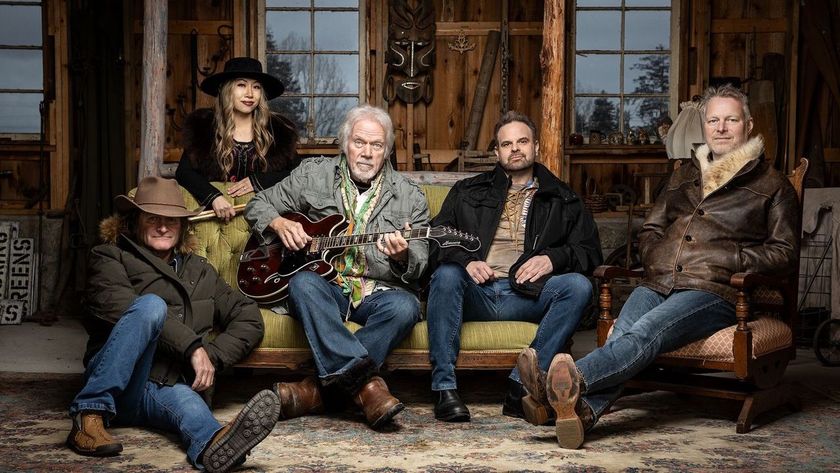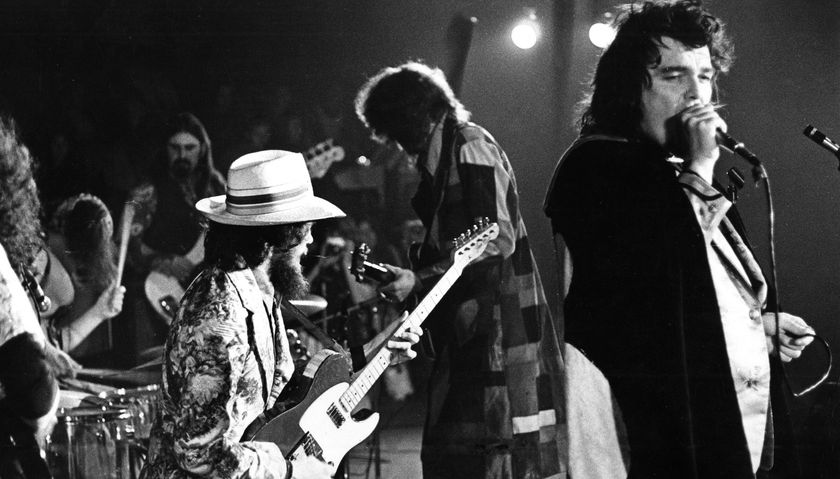Middle Kids’ Hannah Joy: “This album is a bit more reflective – there’s a bit more space and it’s a bit more dynamic”
On their ambitious second album, the band take an axe to their formula and build a mansion from the rubble

Note: this article is also featured in Australian Guitar #142, which is out now wherever great magazines are sold! Click here to read more about what’s in this jam-packed issue!
In the storied three years since they dropped their enigmatic debut album, Lost Friends, the loveable larrikins in Middle Kids have lived a whole damn lot of life. They toured the world twice over, racked up an enviable stack of awards, and popped up on our TV screens at least a solid dozen or so times. Hell, frontwoman Hannah Joy and bassist Tim Fitz even had a kid together! So heading into the fray of their equally exciting and elusive second album, things were obviously going to be a little different.
And it shows. Today We’re The Greatest adds to Middle Kids’ luminescent brand of jammy indie-rock a splash of piano-driven balladry, some fiery post-grunge riffs, and even an unpredictable tinge of avant-garde electronica. It’s a towering triumph of risks paid off by a band eager to make not just a name for themselves, but an inventive and inimitable brand to accompany it.
When she meets up with Australian Guitar to wax lyrical about the new album, Joy seems polarised at the state of affairs. Not even taking into account the multifarious challenges and enormous life events that surrounded its inception, a record like Today We’re The Greatest is far from easy to pull off. That she’s standing on the other side of it – bub in arms and epic world tour ahead, no less – has her absolutely gobsmacked. And she hopes that when fans get their own hands around a copy, they too will be enamoured by what she and her bandmates achieved.
This is my favourite type of second album, because it maintains the spirit of your debut, but also takes so many left turns and exciting risks. Was that something you were excited to explore in following up Lost Friends?
I think so! Because I’d written a lot of these songs over the last couple of years, we just wanted the space to kind of sit in them, to decide where we felt like they could go. We’d written basically all of [Lost Friends] on the road, we recorded like bits and pieces of it at home and then we mixed it mid-tour in America, so it was very much a product of us moving around a lot and having a lot of different influences – even the American rock touring world, in some ways. But this album was a bit more reflective – there’s a bit more space, it’s a bit more dynamic, and we really just wanted to tease out some of our musicality. Lost Friends is a lot more action-packed and rock-y; [Today We’re The Greatest] has moments of that, for sure, but it’s a bit softer and more delicate in some moments.
Thematically this record feels a little less ambiguous – there’s a lot of vulnerability and openness in the lyrics. Did you go into this record feeling more confident, having tested the waters on LP1?
Probably. I’m striving to live more vulnerably in general, and y’know, doing that ends up influencing how you write and the way you communicate. I definitely see our music linked to how we’re trying to live and what we’re doing, and that definitely comes out in the writing. This record is way more vulnerable and personal – I used to write a lot more… Almost like stories, or folklore – a lot more heady, think-y lyrics – whereas this album comes a lot more from the heart and the gut. It’s cool, but it’s also a bit like, “AAAAAAAH!”
How did that translate to your role in Middle Kids as a guitarist?
It’s cool because the guitar is a newer instrument for me. I started on the piano, but the guitar was like a gateway into being able to play rock music – which I’ve always loved, but I never felt like I could get into it because I played the piano. So the guitar is very special to me – he’s my little friend that brought me into the rock world. A lot of the early Middle Kids stuff was way more guitar-heavy because I was writing pretty much solely on the guitar. But there’s a lot more keys-based material on this record, too, and it’s more instrumentally diverse. I think it works in the guitar’s favour in the end, though, because the guitar moments really shine through a lot more with all the different timbres and textures going on.
Get The Pick Newsletter
All the latest guitar news, interviews, lessons, reviews, deals and more, direct to your inbox!
So was there a lot of experimentation going on? Were you throwing stuff at the wall and seeing what sticks, or did you have all the ideas ready to go in your head before you picked up the guitar?
I think the bones were definitely there, but it was cool because this was the first time we’d recorded in a proper studio. Usually we would just record at home, but we did this album in a studio in LA; there was the A room and the B room, and the B room was where Tim would spend most of his time – it was like his little lair where he’d go and play around with random synths and guitars. A lot of the colours on the album come from that. On a couple of the tracks like “Questions” and “Cellophane”, there are these little glitchy, musical little moments, and a lot of that happened in the B room. So we had all the song ideas there, but we’d really flesh them out by trying different things in our little lair.
What can you tell us about the gear you were all bashing away on?
I used my Cole Clark electric a lot – it kind of looks like a Strat, and I’ve been playing it for years. That’s been the bedrock of my guitar sound since the band started, really. And then there were a bunch of guitars that our producer, Lars Stalfors, had laying around. He had a bunch of Japanese guitars that I loved – one of them was this really cool Nivico. I also recently got this new little Gibson acoustic which is really, really beautiful. It’s my first real acoustic guitar, and the first song on [Today We’re The Greatest], “Bad Neighbours”, was all done on that guitar. It was really fun to have my faithful old Cole Clark, then mix it up with some other random bits and pieces. There was even a six-string banjo that we were playing, which was really cool. And then we played a 12-string on a bunch of songs, like “Stacking Chairs” – that was a big part of that song’s sound.
What is it about the Cole Clark that really won your heart?
It’s got quite a rich, warm sound, and I really love the way it plays. I don’t know if this has anything to do with anything, but I’m left-handed, and on the piano the left hand is always on the bass, so I’ve always just loved the lower end of the sound spectrum. I love this guitar because it almost feels a bit baritone-y. Every time I play it, it just sounds so gorgeous. I have a few other guitars that I love as well, but I always come back to the Cole Clark. And it’s cool because Cole Clark don’t make electric guitars anymore, so that makes it a little more special as well.

Ellie Robinson is an Australian writer, editor and dog enthusiast with a keen ear for pop-rock and a keen tongue for actual Pop Rocks. Her bylines include music rag staples like NME, BLUNT, Mixdown and, of course, Australian Guitar (where she also serves as Editor-at-Large), but also less expected fare like TV Soap and Snowboarding Australia. Her go-to guitar is a Fender Player Tele, which, controversially, she only picked up after she'd joined the team at Australian Guitar. Before then, Ellie was a keyboardist – thankfully, the AG crew helped her see the light…

"The BTO sound is BACK!!" Bachman-Turner Overdrive release first new material in over 25 years – and it features a Neil Young guitar solo

“He would beat the crap out of the guitar. The result can best be described as Jackson Pollock trying to play like John Lee Hooker”: Aggressively bizarre, Captain Beefheart's Trout Mask Replica remains one of the craziest guitar-driven albums ever made









